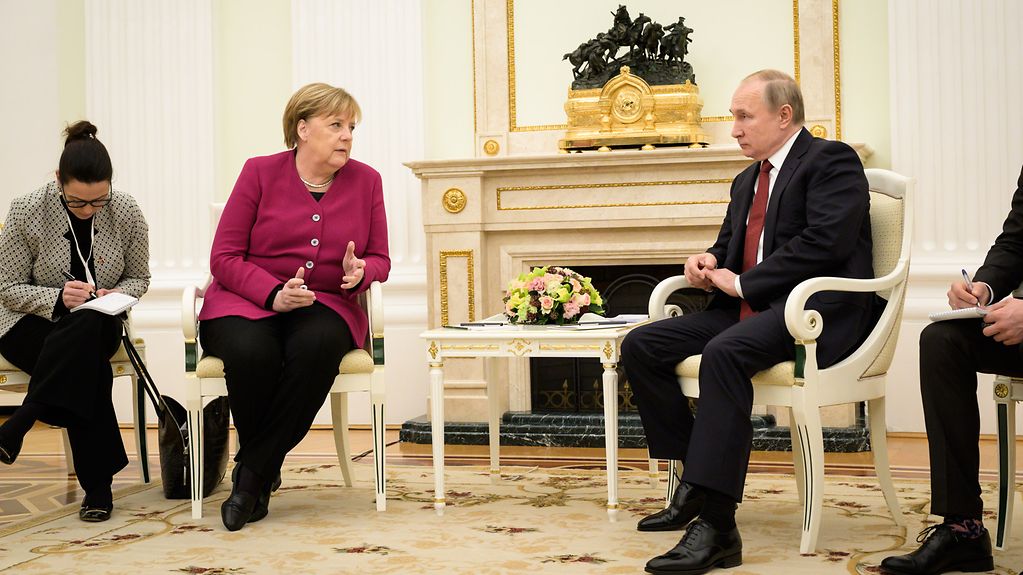Chancellor Angela Merkel in Moscow
On Saturday, Chancellor Angela Merkel flew to Moscow for a working visit that had been planned for some time. She was accompanied by Federal Foreign Minister Heiko Maas. Various topical international and bilateral issues, including the situation in the Gulf and in Ukraine, were on the agenda of her one-day meeting with the Russian President.

Chancellor Angela Merkel in conversation with Russian President Vladimir Putin
Photo: Bundesregierung
In Moscow, Chancellor Angela Merkel has discussed numerous international topics with Russian President Vladimir Putin. The situation in Syria, Libya and Ukraine were on the agenda, as well as the situation in Iraq and Iran. The Chancellor stressed that there can be no military solution in either Syria or Libya, where a political solution is the only way forward. "And we are doing everything possible to achieve that," said the Chancellor.
"Full and complete" investigation
With respect to the situation in Iran, Angela Merkel and Vladimir Putin agreed that all efforts should be directed towards preserving the Joint Comprehensive Plan of Action (JCPOA). "It is Germany’s conviction that Iran should not acquire any nuclear weapons and should not have any," reiterated the Chancellor.
With a view to the aircraft crash in Iran, Angela Merkel said that it is good that it is now known who was responsible. "It is important that the matter be subject to a full and complete investigation and the first step in this direction was taken today."
In her one-on-one meeting with Vladimir Putin, the Nord Stream gas pipeline was also discussed. The project is legitimated by new European legislation and should thus be completed, said the Chancellor.
Berlin Conference on Libya
In Libya the situation has also escalated following Turkey’s decision to intervene directly. The joint call issued by Russia and Turkey for a ceasefire as of 12 January is a step in the right direction, reported the Chancellor. "We hope that the Russian-Turkish efforts are successful," she said in Moscow. To resolve the conflict in Libya, the Chancellor intends to hold a conference in Berlin in the very near future.
At the last meeting of what is known as the Normandy Group or N4 to discuss the Ukraine conflict, which was held at the start of December in Paris, the Chancellor and the Russian President agreed to meet again soon for bilateral talks focusing on international issues.
Making progress on implementing the Minsk agreements
In Moscow the two leaders thus also discussed preparations for the N4 follow-up meeting to be held early this year in Berlin. It will look at the further implementation of the Minsk package of measures. To bring peace to eastern Ukraine, progress on the political conditions and security issues in particular would be desirable. It must, for instance, be ensured that local elections are organised in eastern Ukraine. Other unresolved problems include the full withdrawal of foreign troops and the restoration of Ukrainian sovereignty over its eastern border.
Global political situation overtakes planning
One point of the agenda of the meeting in Moscow, which has become more urgent over the last few days, is the situation in the Gulf. The need to end the spiralling violence in Iraq following Iran’s latest missile strikes was one point discussed by the Chancellor and the Federal Foreign Minister Heiko Maas with their Russian counterparts. Germany believes the priority must be de-escalation and stabilisation in Iraq. Equally, the international coalition fighting the so-called Islamic State (IS) must be preserved.
Russia is an important actor on the world stage. In the United Nations Security Council in particular, Russia is indispensable when it comes to achieving a political solution to conflicts. In view of this, Chancellor Angela Merkel discussed the worsening humanitarian crisis in northern Syria with President Vladimir Putin. A request lodged by Germany, Kuwait and Belgium in December to extend the UN mandate enabling aid organisations to use certain border crossing points into Syria to supply relief goods to the suffering population on the ground, was earlier vetoed by Russia and China. Shortly before the deadline on Saturday night, the Security Council finally agreed on a new weaker Resolution which it then adopted.